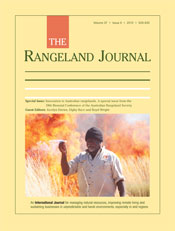The Rangeland Journal
Volume 37
Number 6 2015
Innovation in Australian Rangelands. A special issue from the 18th Biennial Conference of the Australian Rangeland Society
People are working together in new ways in Australia’s rangelands, sharing and applying knowledge to emerging challenges. This innovation is important for continuing to move rangelands people, communities and landscapes towards sustainability. Transformational change is strongly in the national interest and can result from people nudging rangelands positively to a better place.
Enormous positive changes for the rangelands, and Australia, have come through the determination, collaborations, partnerships and opportunism of people and organisations. Rangelands people from all walks of life still have challenges of powerlessness in the face of distant governments and their decisions. Continually nudging the world of the rangelands to a better place is an important and honourable role for everyone.
Knowledge broker is an undervalued and underutilised role in transferring scientific information to end users. In the rangelands of Australia the difficulty of transfer of scientific information to end users is increased through remoteness of parties. This project demonstrates how investing in a knowledge broker can achieve effective delivery of results even with distant and diverse participants.
The inclusion of Indigenous knowledge into management of water resources offers an important mechanism for policy makers to maintain ecosystem quality while acknowledging Indigenous interest. This project developed cultural water indicators for the Arabana, an Indigenous group from Kati Thanda-Lake Eyre, Australia. The Arabana people have multiple values for water sites, and their assessment of environmental quality can operate side by side with scientific indicators showing the importance of the co-existence of cultural and scientific knowledge.
The Nature Conservancy, BHP Billiton and Kanyirninpa Jukurrpa are working together to achieve positive outcomes for Martu people and their country in Australia’s Western Desert. The partnership helps Martu people conserve their culture and country by cleaning waterholes; improving fire management; controlling ferals; managing cultural heritage; and protecting threatened species. Measurable benefits have been achieved for Martu people and their natural environment – part of the largest intact arid ecosystem anywhere on Earth.
Remote town hinterlands suffer and benefit from a reliance on the core mining town for their viability. Until now this dependency has not been measured and tested and here we do so through contrasting examples of dependent mining town hinterlands and their cores. These findings have immediate implications for the regions concerned and provide decision-makers and planners with further evidence to assist in reducing the vagaries of the mine lifecycle and dependency in remote rangeland regions.
Although Indigenous rangers frequently manage heritage sites, no planning tools exist to support them plan for climate-change impacts on sites; this study devises such a tool. No previous research has directly and exclusively documented Indigenous perceptions of potential climate-change impacts on heritage sites. I found that in two case studies Indigenous rangers perceived a range of potential climate-change impacts on particular site types and regarded managing these impacts as a priority.
The financial sustainability of Australian rangeland pastoralism is questionable. Data are presented to show that only ~20% of family owned Australian rangeland beef businesses can meet the criteria for long-term financial sustainability and this may not provide the critical mass for a viable industry going forward. The change needed to improve this outlook would appear to be a function of producer attitude to the available knowledge and protocols.
Adapting to climate change is one of the most urgent challenges facing contemporary rangelands. However, recent research suggests that the capacity of Australian cattle producers is woefully low. Here we gain insight into, and propose a range of strategies that might be used to enhance the capacity of people dependent on rangelands.
Only ~15% of Australians now live outside the cities and the essentially suburban coastal corridor with little knowledge of the rangelands. Under pressure of globalisation and market economics the narrative of the rangelands has changed and with that the national interest in the rangelands has declined. This paper argues for a narrative with a more disruptive and innovative radicalisation of the rangelands in Australia to re-ignite national interest and national investment.




